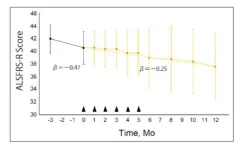(Press-News.org) Amyotrophic lateral sclerosis (ALS) is a neurodegenerative disease characterized by progressive loss of motor functions, which eventually leads to death within 5 years of its onset. This disease causes weakness and atrophy of limbs and other muscles, which affect mobility speech, eating, and even breathing in patients. Some drugs, including riluzole, edaravone, and sodium phenylbutyrate/taurursodiol are used for treating ALS, but with limited therapeutic benefits. Therefore, novel, effective ALS treatments are the need of the hour.
Multilineage-differentiating stress-enduring (Muse) cells are pluripotent stem cells derived from the bone marrow, which can be intravenously administered into damaged tissues. Recent studies have found that regular administration of Muse cells causes tissue repair and functional recovery in mouse models of hepatitis, muscle degeneration, and heart attack. Moreover, it leads to significant improvement in limb muscle weakness, inhibits the activation of inflammation and regulates immune functions. Keeping this in view, a Muse cell-based product called CL2020 was developed to utilize the therapeutic potential of Muse cells for treating ALS patients.
Recently, scientists in Japan conducted a single-center open phase II clinical trial to evaluate the safety and treatment efficacy of repeated intravenous injections of CL2020 in patients with ALS. The results of this study were published online in Cell Transplantation on November 28, 2023. The trial was led by Associate Professor Toru Yamashita from Okayama University Graduate School of Medicine, Dentistry and Pharmaceutical Sciences and Dr. Koji Abe from National Center of Neurology and Psychiatry, Japan. “Since ALS is a progressive disease, we used multiple regular doses of CL2020, with one monthly dose administered intravenously for six doses. The dosage was set at 15×106 cells/dose, proven safe in trials for other illnesses. We only recruited five ALS patients, as this is the first clinical trial for confirming the safety of multiple CL2020 doses,” explains Dr. Yamashita.
The primary focus of the trial team was determining the safety and tolerability of CL2020 for up to 12 months after the first administration. In addition, the team assessed disease progression by evaluating the rate of change in the Revised Amyotrophic Lateral Sclerosis Functional Rating Scale (ALSFRS-R) scores over 12 months. ALSFRS-R uses different criteria, including speaking, eating, swallowing, motor functions, and respiratory failure, among others to reflect ALS progression in patients. The team also analyzed the levels of serum tumor necrosis factor-α (TNF-α), interleukin-6 (IL-6), and sphingosine-1-phosphate (S1P), along with cerebrospinal fluid chitotriosidase-1 (CHIT-1) and neurofilament light chain (NfL), at the beginning of the trial and regularly for 12 months after the first dose. TNF-α, IL-6, and S1P are biomarkers associated with inflammatory response and pathogenesis of ALS. Whereas CHIT-1 and NfL are associated with ALS progression and patient survival, which can indicate treatment prognosis and efficacy.
The trial found CL2020 to be highly tolerated by all patients without severe side effects, like pulmonary embolism and anaphylactic shock. However, one patient had a bone fracture a year after the initial dose but with no significant causal relationship to the CL2020 treatment. Furthermore, the rate of change in the ALSFRS-R scores improved at 12 months post-treatment, as compared to at 3 months pre-treatment, and the scores did not worsen until 6 months post-treatment for three patients. This indicates that multiple CL2020 doses can prevent or delay the symptoms of ALS from worsening.
However, the serum IL-6, TNF-α, CHIT-1, and NfL levels increased over 6 months post-treatment, suggesting that CL2020 may not suppress the secretion of inflammatory cytokines in ALS patients— which only tends to increase with disease progression. In contrast, serum S1P levels continuously decreased over 12 months, indicating that CL2020 might functionally neutralize S1P and thus reduce related signaling in ALS patients.
These findings show that multiple CL2020 doses are safe for use in ALS patients. But while this treatment can potentially abate the worsening of some ALS symptoms, it alone may be inadequate to completely halt disease progression. Therefore, a combination therapy of CL2020 with other drugs currently used for ALS should be considered for future treatments. “Given the promising results of this trial, we now need a double-blind study to be conducted, which includes a larger number of ALS patients with a longer observation period to confirm CL2020’s efficacy. Thereafter, we can propose this treatment for ALS patients,” concludes Dr. Yamashita.
About Okayama University, Japan
As one of the leading universities in Japan, Okayama University aims to create and establish a new paradigm for the sustainable development of the world. Okayama University offers a wide range of academic fields, which become the basis of the integrated graduate schools. This not only allows us to conduct the most advanced and up-to-date research, but also provides an enriching educational experience.
Website: https://www.okayama-u.ac.jp/index_e.html
About Associate Professor Toru Yamashita from Okayama University, Japan
Toru Yamashita is an Associate Professor at the Department of Neurology, Okayama University Graduate School of Medicine, Dentistry and Pharmaceutical Sciences, Japan. His areas of research include ischemic stroke, Alzheimer’s disease, stem cells, and amyotrophic lateral sclerosis, among others. Before he started teaching at Okayama University Prof. Yamashita was a physician and resident at the university hospital and a resident at the National Hospital Organization Okayama Medical Center. He has also been a research fellow at the Department of Physiology at Keio University’s School of Medicine, Japan and a postdoctoral scientist at Columbia University, USA. In 2010, he won the Japan Stroke Society Young Scholar’s Award, Okayama Medical Association Award.
END
Insights from a phase II clinical trial with CL2020 Muse cell-based therapeutic for Amyotrophic lateral sclerosis
A clinical trial evaluated the favorable safety profile of Muse cell-based product, CL2020, in treating patients with Amyotrophic lateral sclerosis.
2024-02-01
ELSE PRESS RELEASES FROM THIS DATE:
Increased temperature difference between day and night can affect all life on earth
2024-02-01
Researchers from Chalmers University of Technology, in Sweden, have discovered a change in what scientists already knew about global warming dynamics. It had been widely accepted since the 1950s that global temperature rises were not consistent throughout the day and night, with greater nighttime warming being observed. However, the recent study reveals a shift in dynamics: with greater daytime warming taking place since the 1990s. This shift means that the temperature difference between day and night is widening, potentially affecting all life on Earth.
The ...
Rice research unveils key dynamics of 2D nanomaterials with view to larger-scale production
2024-02-01
HOUSTON – (Feb. 1, 2024) – A team of Rice University researchers mapped out how flecks of 2D materials move in liquid ⎯ knowledge that could help scientists assemble macroscopic-scale materials with the same useful properties as their 2D counterparts.
“Two-dimensional nanomaterials are extremely thin ⎯ only several atoms thick ⎯ sheet-shaped materials,” said Utana Umezaki, a Rice graduate student who is a lead author on a study published in ACS Nano. “They behave very differently from materials we’re used to in daily life and can have really useful properties: They can withstand a lot of ...
CT scan is most effective to assess people with chest pain
2024-02-01
Previous studies have found less than 40% of patients with stable chest pain undergoing invasive coronary angiography are found to have obstructive coronary artery disease. Recent randomized clinical trials have demonstrated a benefit to using computed tomography angiography (CTA) first in evaluation of these patients, and a new study being presented at the American College of Cardiology Cardiovascular Summit lends credence to this strategy, finding that CT was associated with a higher likelihood of revascularization compared to other imaging modalities or no testing.
Stable angina ...
UMass Chan advances research into long COVID, chronic fatigue syndrome
2024-02-01
A study led by UMass Chan Medical School viral immunologists Liisa Selin, MD, PhD, and Anna Gil, PhD, discovered similarities in immune system dysfunction as a potential biomarker among people living with long COVID and myalgic encephalomyelitis/chronic fatigue syndrome (ME/CFS). The research also introduced a novel treatment and a method to track effective treatment interventions. The research was published online in Brain, Behavior & Immunity.
Dr. Selin, professor of pathology, ...
Black women with high blood pressure before age 35 may have triple the risk of a stroke
2024-02-01
Research Highlights:
Black women who develop high blood pressure before age 35 may have triple the odds of having a stroke, and those who develop high blood pressure before age 45 may have twice the risk of suffering a subsequent stroke.
The findings, from a study of 59,000 Black women in the U.S., are important for expanding high blood pressure screening and treatment in this high-risk population.
Researchers say health care professionals should be vigilant in high blood pressure screening and ...
Experiencing “stroke-like” symptoms may be more traumatic than an actual stroke
2024-02-01
Research Highlights:
One month after hospital evaluation for stroke-like symptoms, people whose symptoms were attributed to another condition were 3 times more likely to have increased risk of post-traumatic stress disorder (PTSD) than people diagnosed with a confirmed stroke.
Knowing that the experience of being evaluated for stroke can itself be traumatic may help health care professionals recognize PTSD symptoms and connect people quickly to the appropriate resources.
Embargoed until 4 a.m. CT/5 a.m. ET, Thursday, Feb. 1, 2024
DALLAS, Feb. 1, 2024 — People with so-called stroke mimics may be even more likely to develop post-traumatic stress ...
Lifetime exposure to sexual assault and other traumatic stress may harm stroke recovery
2024-02-01
Research Highlights:
Lifetime exposure to different types of traumatic events or stress appears to reduce the chances for optimal recovery after a stroke.
A review of health records for U.S. stroke survivors found that sexual assault was consistently linked to worse physical functioning and poorer cognitive recovery measurements one year after a stroke.
Embargoed until 4 a.m. CT/5 a.m. ET, Thursday, Feb. 1, 2024
DALLAS, Feb. 1, 2024 — Stressors and traumatic events experienced over the course of a lifetime may negatively impact subsequent stroke recovery; specifically, stroke survivors exposed to sexual assault at any point in their life had poorer physical functioning ...
Risk of dementia was nearly three times higher the first year after a stroke
2024-02-01
Research Highlights:
In a large population study conducted in Canada, the risk of dementia was nearly 3 times higher in the first year after a stroke, then fell to a 1.5-times increased risk by the 5-year mark and remained elevated 20 years later.
Having a stroke increased the risk of dementia by 80%, even after accounting for other dementia risk factors, such as high blood pressure, Type 1 or Type 2 diabetes and high cholesterol.
Embargoed until 4 a.m. CT/5 a.m. ET, Thursday, Feb. 1, 2024
DALLAS, Feb. 1, 2024 — Having a stroke may significantly increase the risk of developing dementia. ...
Nerve stimulation plus intense rehab may improve arm and hand function after stroke
2024-02-01
Research Highlights:
Stimulating a nerve that runs between various organs and the brain with intense physical rehabilitation improved arm and hand function in people with stroke.
The improved motor function remained at the end of the one-year follow-up.
Vagus nerve stimulation uses an implantable device to stimulate the nerve with electrical impulses that help create new pathways in the brain to assist movement in impaired limbs.
Embargoed until 4 a.m. CT/5 a.m. ET, Thursday, Feb. 1, 2024
DALLAS, Feb. 1, 2024 — Combining brain ...
Where you live may be associated with more successful stroke recovery
2024-02-01
Research Highlights:
Stroke survivors living in areas with high levels of unemployment, low income, low education levels and poor housing quality had twice the risk of poor recovery after a stroke compared to those living in areas with better conditions.
The researchers say this study may help promote awareness of how social determinants of health are as important as clinical variables and health information when trying to identify stroke survivors who are at particularly high risk for poor long-term outcomes.
Embargoed until 4 a.m. CT/5 a.m. ET, Thursday, Feb. 1, 2024
DALLAS, Feb. 1, 2024 — Stroke survivors living in areas with ...
LAST 30 PRESS RELEASES:
Tiny bubbles, big breakthrough: Cracking cancer’s “fortress”
A biological material that becomes stronger when wet could replace plastics
Glacial feast: Seals caught closer to glaciers had fuller stomachs
Get the picture? High-tech, low-cost lens focuses on global consumer markets
Antimicrobial resistance in foodborne bacteria remains a public health concern in Europe
Safer batteries for storing energy at massive scale
How can you rescue a “kidnapped” robot? A new AI system helps the robot regain its sense of location in dynamic, ever-changing environments
Brainwaves of mothers and children synchronize when playing together – even in an acquired language
A holiday to better recovery
Cal Poly’s fifth Climate Solutions Now conference to take place Feb. 23-27
Mask-wearing during COVID-19 linked to reduced air pollution–triggered heart attack risk in Japan
Achieving cross-coupling reactions of fatty amide reduction radicals via iridium-photorelay catalysis and other strategies
Shorter may be sweeter: Study finds 15-second health ads can curb junk food cravings
Family relationships identified in Stone Age graves on Gotland
Effectiveness of exercise to ease osteoarthritis symptoms likely minimal and transient
Cost of copper must rise double to meet basic copper needs
A gel for wounds that won’t heal
Iron, carbon, and the art of toxic cleanup
Organic soil amendments work together to help sandy soils hold water longer, study finds
Hidden carbon in mangrove soils may play a larger role in climate regulation than previously thought
Weight-loss wonder pills prompt scrutiny of key ingredient
Nonprofit leader Diane Dodge to receive 2026 Penn Nursing Renfield Foundation Award for Global Women’s Health
Maternal smoking during pregnancy may be linked to higher blood pressure in children, NIH study finds
New Lund model aims to shorten the path to life-saving cell and gene therapies
Researchers create ultra-stretchable, liquid-repellent materials via laser ablation
Combining AI with OCT shows potential for detecting lipid-rich plaques in coronary arteries
SeaCast revolutionizes Mediterranean Sea forecasting with AI-powered speed and accuracy
JMIR Publications’ JMIR Bioinformatics and Biotechnology invites submissions on Bridging Data, AI, and Innovation to Transform Health
Honey bees navigate more precisely than previously thought
Air pollution may directly contribute to Alzheimer’s disease
[Press-News.org] Insights from a phase II clinical trial with CL2020 Muse cell-based therapeutic for Amyotrophic lateral sclerosisA clinical trial evaluated the favorable safety profile of Muse cell-based product, CL2020, in treating patients with Amyotrophic lateral sclerosis.




